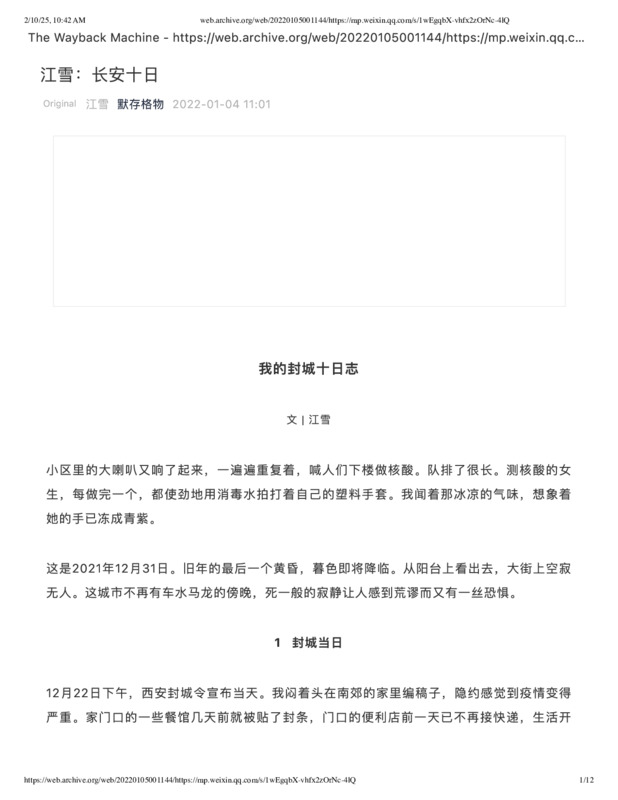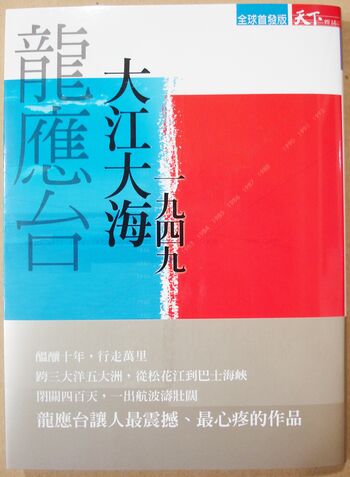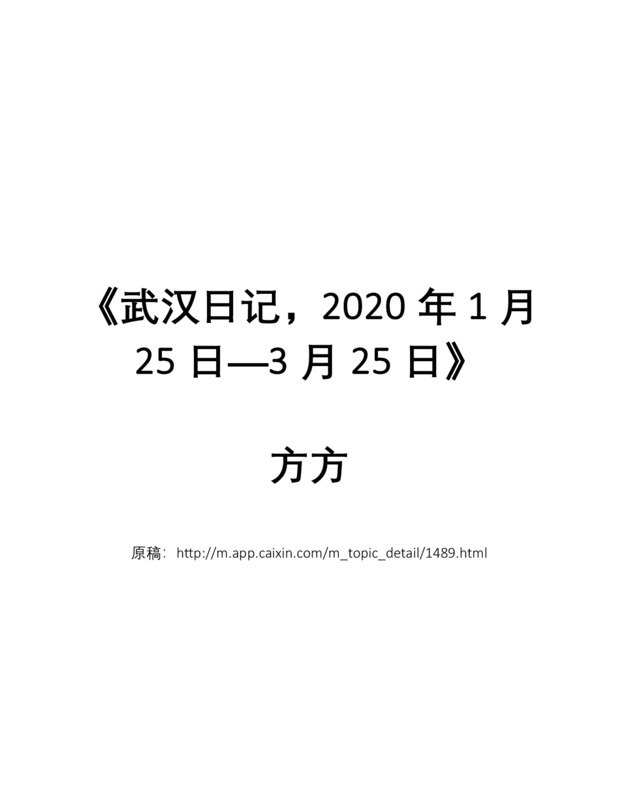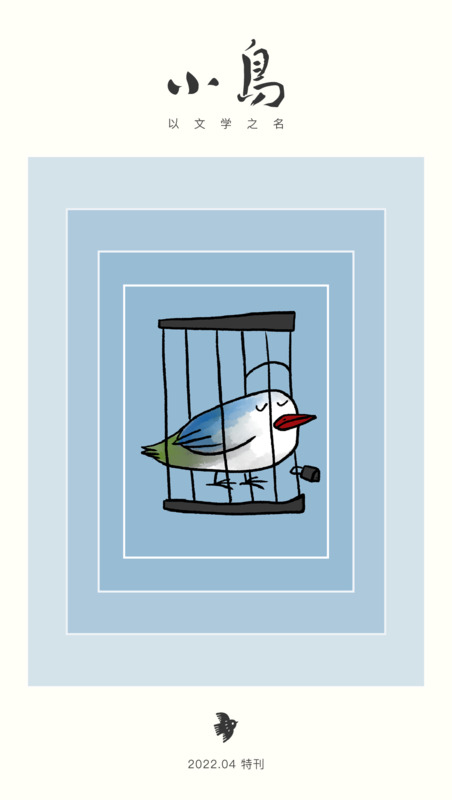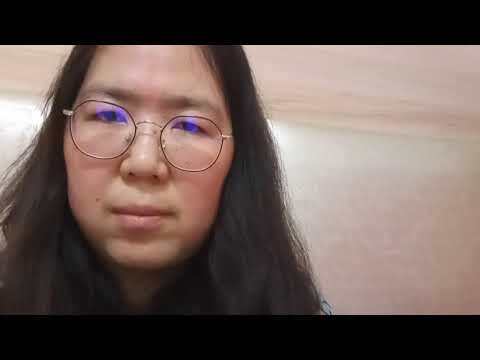Explore the collection
Showing 14 items in the collection
14 items
Book
Our Stories: Women in COVID-19 in China
This is the fourth issue of the “Our Stories” series published by WeChat public account “We and Equality,”, a compilation of 20 oral narratives from Chinese people who lived through the COVID-19 pandemic firsthand, and a personal reflection by the author of this issue, Qiao Yilin. The editors hope to “document the history of ordinary people, to combat the forgetting that should never have happened, and to present the real experiences, feelings, and voices of all of us–to help us remember what has happened to us.”
The interviewees in this volume are diverse, including those of different ages, educational background, ethnicities, physical and mental status, sexual orientations,marital status, and mobility. They shared their own memories of the pandemic, including facing threats to their survival due to food shortage, not being able to take anti-depression medication due to the lockdown, international students having a hard time returning to China, people with hearing impairments facing various inconveniences, and the discrimination faced by those who had recovered from COVID-19Although primarily focusing on experiences and feelings during the pandemic, many interviewees shared additional personal stories that provided useful background information for readers to understand their situation during the pandemic.
In addition to these personal narratives, “We and Equality” also published a 44-question “Women's Mental Health Questionnaire” on WeChat, asking about respondents’ experience during the pandemic, including their sense of belonging, care/housework commitments, sleep quality, emotional and mental status, feeling about quarantine, lockdown, illness or death of loved ones, and attitudes towards the government’s COVID-19 policies. The questionnaire received a total of 453 valid responses. Based on the responses, “We and Equality” has compiled a bilingual data analysis report.
”We and Equality" is a grass root project started in November 2016. Through the WeChat public account, they publish articles weekly to raise awareness and share knowledge on gender-related issues in China. They also organize in-person activities bi-weekly where people gather for in-depth discussion, and foster a community to promote gender equality.
Book
Mao: The Unknown Story
This book presents the dramatic life of Mao Zedong, revealing a wealth of unheard-of facts: why Mao joined the Communist Party, how he came to sit at the top of the Chinese Communist Party, and how he seized China step by step. Writers Jung Chang and her husband Jon Halliday took ten years to complete this book, interviewing hundreds of Mao's relatives and friends, Chinese and foreign informants and witnesses who worked and interacted with Mao as well as dignitaries from various countries.
Purchase link:https://www.amazon.com/Mao-Story-Jung-Chang/dp/0679746323.
Book
My Mother :Gao Yaojie
Author Eva writes about her relationship with Gao Yaojie, a Chinese doctor. Dr. Gao Yaojie, who was severely repressed by the Chinese government for exposing the mass infection of Chinese farmers in Henan Province, China, by selling their blood, had no choice but to leave China at the age of 78 and go into exile in the United States. The dissemination of her story is strictly forbidden in China. In this book, author Eva describes Gao Yaojie's noble heart, her story, and her experiences.
Film and Video
New Citizens’ Trial
In late January 2014, on the eve of the Lunar New Year, Xu Zhiyong, Zhao Changqing, Ding Jiaxi and other advocates of the New Citizens’ Movement were charged with "gathering a crowd to disrupt order in a public place." The case was heard for the first time in courts at different levels in Beijing. This film intersperses on-site records with interviews with defense lawyer Zhang Qingfang, scholar Guo Yuhua, entrepreneur Wang Ying, and others to present citizens' understanding of the New Citizens' Movement.
This series of films are in Chinese with Chinese subtitles.
Film and Video
Not the Foreign Force
During the three years of the "zero-COVID" policy enforced by Xi Jinping's government, the daily life and freedoms of the people were severely limited. A fire in Urumqi, Xinjiang, finally ignited public dissatisfaction with the measures. On November 26, 2022, when the people of Shanghai spontaneously gathered in the streets to mourn the victims of the fire, no one expected that this memorial activity would lead to nationwide protests against the pandemic policies. At the scene, Chen Pinlin and his girlfriend, Wang, filmed many protest videos at the protest site on Urumqi Middle Road in Shanghai.
In November 2023, on the anniversary of the White Paper Movement, Chen Pinlin uploaded the documentary to YouTube and other social media platforms, garnering hundreds of thousands of views. Less than a week later, he and his girlfriend were arrested. His girlfriend was released on bail, while Chen Pinlin remained in custody.
<a href=“https://tenchu.org/pocd/public/pocs/3551”>Chen Pinlin introduced the documentary as follows</a>: "I am the director Plato. In November 2022, I personally participated in the protest on the night of November 26 in Shanghai. This was my first involvement in a political event in China, and it was also the first time I expressed my political demands in China. Besides the footage I personally filmed on that day, the film also includes iconic video materials from before and after the protest. I tried to present a complete picture of how the dynamic zero-COVID policy pushed China to the boiling point and prompted people to take to the streets to protest. After the event, the Chinese government distorted the facts and maliciously smeared the protests in Shanghai and the White Paper movement, misleading many people into thinking that the protests were the work of foreign forces. But is this really the case? On the first anniversary of the Shanghai Urumqi Road protest, I created this documentary, “Urumqi Middle Road”, to record my personal experience and feelings of participating in the protest. I want to explore why, when internal contradictions appear in China, foreign forces are always blamed? Everyone knows the answer. The more the government misleads, forgets, and shields the truth, the more we must speak out, remind people, and remember. Remember the White Paper, remember November 26, remember Urumqi Middle Road, remember the Xinjiang fire, remember the Guizhou bus, remember dynamic zero-COVID, remember the 'big white' (the white-suited workers), remember Tiananmen, remember the Cultural Revolution, remember the Three Years of Great Famine. "By remembering the ugliness, we can turn our hearts toward the light. I also hope that China can soon embrace its own brighter future."
At the end of this movie, Chen left this narration: Some people say, what is the point of protesting on the streets? In the end, it's still the same, suppressed, shielded and misinterpreted. But as Churchill said, ‘Courage is the most important human trait, with courage, other human traits can naturally be possessed' We lacked experience and have been cowardly and wavering, but today we have the courage to stand up and to speak out. What we lacked this time, we can do better next time. If I were to do it again, I would still choose to be there. Because a government that is afraid of even a white paper can't defeat the justice in the hearts of the people.
On January 5, 2024, Chen Pinlin was formally arrested on suspicion of "picking quarrels and provoking trouble" and detained at Baoshan District Detention Center in Shanghai. On January 6, 2025, Chen Pinlin’s first trial was held in the Third Court of Baoshan District Court, where he was sentenced to 3 years and 6 months in prison. His sentence will end on May 27, 2027.
Article
Ten Days in Xi'an
Published on January, 2022, “Ten Days in Xi’an” is a log of Chinese independent journalist Jiang Xue’s daily experiences under COVID-19 lockdown, posted onto WeChat’s social media platform. In this piece, Jiang depicts the crises and challenges faced by Xi’an residents under lockdown, such as the lack of access to medical resources. “Ten Days in Xi’an” was viewed by millions of Chinese users on social media platforms when it was posted, and received comments and support from thousands of Chinese citizens. It was later translated into English by Andréa Worden and published on Probe International virtually. You can find the translated article in the PDF below, or through this link: <https://journal.probeinternational.org/2022/08/22/ten-days-in-xian/>.
Book
The Great River and the Sea: 1949
This book by Taiwanese author Lung Ying-tai, published by Taiwan's <i>World Magazine</i> in 2009, is a detailed account of the history related to the period before and after the 1949 Nationalist-Communist Civil War from a literary perspective. After ten years of preparation, Long Yingtai traveled for 400 days to Changchun, Nanjing, Shenyang, Matsu, Taitung, and Pingtung to visit many survivors of the Nationalist-Communist Civil War.
Film and Video
The Memo
In the spring of 2022, a wave of COVID-19 exploded in Shanghai. Under the policy of “Zero COVID,” 24 million residents were put under forced lockdown. Filmmakers and reporters used their phones, televisions, the internet, and other materials to capture scenes of lockdown and disputes between officials and civilians in Shanghai. Producers of this short film titled <i>The Memo</i> believe that it is necessary to record this historic episode in order to prevent our memories from fading away.
The production team, which was founded in 2020, strives to create works about the lower classes of Chinese society. <i>The Memo</i> was nominated for the Clermont-Féron Short Film Festival.
Book
Wuhan Diary: Dispatches from a Quarantined City
This book is a collection of diary entries written in the early months of the COVID-19 pandemic by Fang Fang, a Chinese writer and advocate of the working poor in China. In these diary entries, Fang Fang documents the various daily difficulties faced by her and other Wuhan residents from January to March 2020. In this book, she also ponders the implications of official policies with regard to the pandemic and the way in which the public and the government have responded to the outbreak of COVID-19. These entries tell us about the hopes and fears of the people of Wuhan during the early stage of COVID-19, and adds to our understanding of public opinion and government policies in China in the 2020s. The diaries were published in Chinese, and have also been translated by Michael Berry into English and published by Harper Collins Publishers.
You can purchase the English version of the book using <a href="https://www.harpercollins.com/products/wuhan-diary-fang-fangmichael-berry?variant=40153409749026">this link</a> .
Periodicals
Xiaoniao Literature - Shanghai Lockdown Special Issues
These three issues published by "Xiaoniao Literature" explore the experiences, emotions, and hardships of Shanghai residents during the COVID-19 lockdowns in 2022. From poetry and photography to opinion and satirical pieces, various writers bring to life the 2022 Shanghai lockdowns for the rest of the world.
"Xiaoniao Literature" publishes twelve issues with over 300 pieces in total per year. Its content includes short novels, opinion pieces, and poetry.
Click [here](https://www.bumingbai.net/2022/06/ep-004-yi-xianfeng-yang-ying/) for an interview by *Bumingbai Podcast* with Yi Xianfeng and Yang Ying, co-founders of *Xiaoniao Literature*.
Film and Video
Xu Zhiyong
Chinese human rights activist Dr. Xu Zhiyong, twice imprisoned for his longstanding advocacy of civil society in China, was sentenced to 14 years in prison by the Chinese government in April 2023. The documentary by independent director Lao Hu Miao was filmed over a four-year period, beginning with the seizure of the Public League Legal Research Center, which Xu Zhiyong helped found in 2009, and ending with Xu's first prison sentence in 2014.
图书
#MeToo in China Archives 2018.1-2019.7
On New Year's Day 2018, Beihang University graduate Luo Xixi took the lead in breaking China's silence on the issue of sexual harassment when she publicly reported on social media that Beihang professor Chen Xiaowu had sexually harassed her. This was the first major event in China’s #Metoo movement, which has since spread from colleges and universities to other fields. #Metoo provoked an unprecedented discussion in China, and the issues of feminism and sexual harassment attracted a rare and widespread attention, with a variety of complaints, comments, studies, and advocacy articles springing up all over the internet.
<i>#MeToo in China Archives 2018.1-2019.7</i> is a compilation of sexual harassment-related articles written between January 2018 and July 2019. This archive is massive, totaling more than 2,500 pages, and is divided into three main volumes: “#Metoo in Higher Education”, “#Metoo in other fields”, and “#Metoo discussions’. Volume I and Volume II consist of individual #Metoo cases, arranged in chronological order. Articles in volume 3 can be broadly categorized into general reviews, investigative reports, personal stories, advocacy and activism, tools and resources,etc. During the #Metoo movement, many liberal public intellectuals questioned the movement, likening it to big-character posters during the Hundred Flowers campaign, and arguing that it might lead to the proliferation of wrongful convictions. It triggered heated debates, and this archive also contains a number of related articles.
The process of compiling this archive itself became an act of resistance, given the severe repression on freedom of expression and social movements. The editorial team faced tremendous challenges in collecting articles that had been deleted or published as images to bypass online censorship. It spent a great deal of time and personnel piecing together scraps of information and transcribing words in images. Reading traumatic personal stories - including those about the hardships in seeking remedies - caused psychological trauma for the editors themselves.
Nevertheless, #Metoo has also a process of collective healing, in which women with shared experiences saw each other, realized the structural problems behind sexual violence, and gained the strength to move on and push for change. Finally, during the compilation process, the editorial team also benefited from archiving efforts made by other websites and individuals, demonstrating that the rescue and preservation of people’s history is a collective and collaborative task.
This archive is published on https://chinesefeminism.org/.
Film and Video
Zhang Zhan Video Series of COVID-19 Outbreak in Wuhan
On 23 January 2020, the Chinese government imposed a lockdown in Wuhan. On February 1, Zhang Zhan took a train from Shanghai to Wuhan. From then until her arrest by the Shanghai police on May 14, Zhang Zhan continued to document the situation in Wuhan on video at the frontline of the pandemic. On February 7, she launched a YouTube channel under her real name and released her first video, “Claiming the Right to Freedom of Expression,” in memory of Dr. Li Wenliang and in solidarity with citizen journalists Chen Qiusi and Fang Bin, who had been taken away for reporting on COVID-19. She said in the video: “If Chinese citizens still do not have the right to freedom of expression,then we are all Li Wenliang." On the same day, Zhang Zhan received a phone call from Shanghai's state security agency threatening to quarantine her if she continued to speak out online, but she did not give in. By the time she was arrested, Zhang Zhan had posted 122 videos on <a href=”https://www.youtube.com/@%E5%BC%A0%E5%B1%95-y3p/featured”>her YouTube channel</a>. In her videos, she traveled around Wuhan at the height of COVID-19, documenting empty streets, the roar of funeral home incinerators late at night, the desperation of patients with no place to turn for medical care, the arbitrary deprivation of residents’ freedom of movement, and the chaotic and hypocritical nature of government policies. These videos show the world the reality of Wuhan in the early days of the outbreak, making thema precious historical record.





